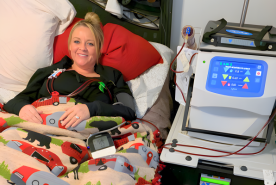Debunk common dialysis myths: pain, cost, travel, work, and patient control. Learn the facts to manage your treatment and stay informed.
Fact
Dialysis can be done in many ways: You can do dialysis in a hospital or an outpatient dialysis clinic or in your own home. Hemodialysis at a dialysis center is typically done three days per week for four hours at a time. But you can also do hemodialysis or peritoneal dialysis at home. Learn more about each dialysis option and talk with your healthcare professional about which type of dialysis is best for you.
Fact
Dialysis treatments should not be painful. If you experience pain during or after treatment you should tell your healthcare team right away. Some patients may have a drop in their blood pressure that could lead to nausea, vomiting, headaches or cramps. However, by following your kidney diet and fluid restrictions these types of side effects can be avoided. If you are on hemodialysis, you may have some discomfort when the needles are put into your fistula or graft, but most patients report that this gets easier with time as your arm becomes used to the needles. There are also medications that can be given to numb the area if needed.
Fact
The federal government pays 80 percent of all dialysis costs for most patients. Private health insurance or state medical aid also helps with the costs. It is important to get and keep adequate insurance coverage. There may be resources available to help pay for treatment or costs associated with treatment. Talk with you social worker or finanical coordinator at your dialysis about options available in your area.
Fact
You can travel on dialysis! But it does take some planning. For those on in-center hemodialysis, there are dialysis centers located in every part of the United States and in many foreign countries. Before you travel, you must make an appointment for dialysis treatments at another center, and send information about your medical treatment and history. Your facility social worker can help inform you about what you need. For those on home dialysis - either peritoneal or home hemodialysis - you can work with your dialysis team to arrange for supplies to be delivered to your destination and most home dialysis machines are portable and come with a traveling case. Traveling on dialysis is all about being prepared - click here to learn more.
Fact
Many dialysis patients continue to work, go to school, or volunteer. Some take time off when they first start dialysis treatment and back to work or school after they have gotten used to dialysis. Talk with your dialysis care team about finding a schedule that fits your needs. Consider dialysis at home for an even more flexibility and independence.
Fact
You are the most important part of your dialysis care team. Each person is unique so be sure to share how you feel and what your goals are with your healthcare team. Sometimes it is easier to talk with your healthcare team off the dialysis unit floor, so don't be afraid to ask for a private meeting. Also, patients have a Bill of Rights which includes quality care, privacy, medical information, social work and dietary counseling. If you feel your concerns are not being addressed, you can file a grievance with your local ESRD Network.
Fact
Many people with a chronic disease feel this way at some point. Your role in your family may change over time, but it is important to remember that you are more than your kidney disease or dialysis treatment! Ask for help when you need it and help others when you can. Be open and honest with your loved ones about how you are feeling and give yourself the space and time you need to adjust to dialysis treatments. Once you adjust to your "new normal" on dialysis you will find you will be able to take on new roles and responsibilities at home again too.
If you would like more information, please contact us.








